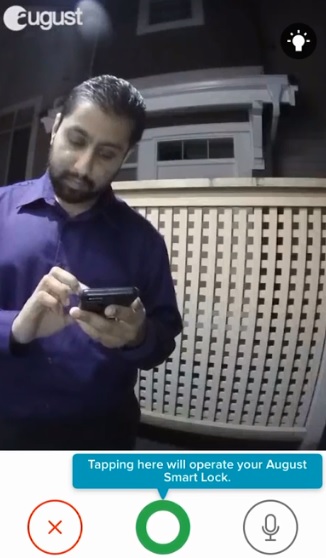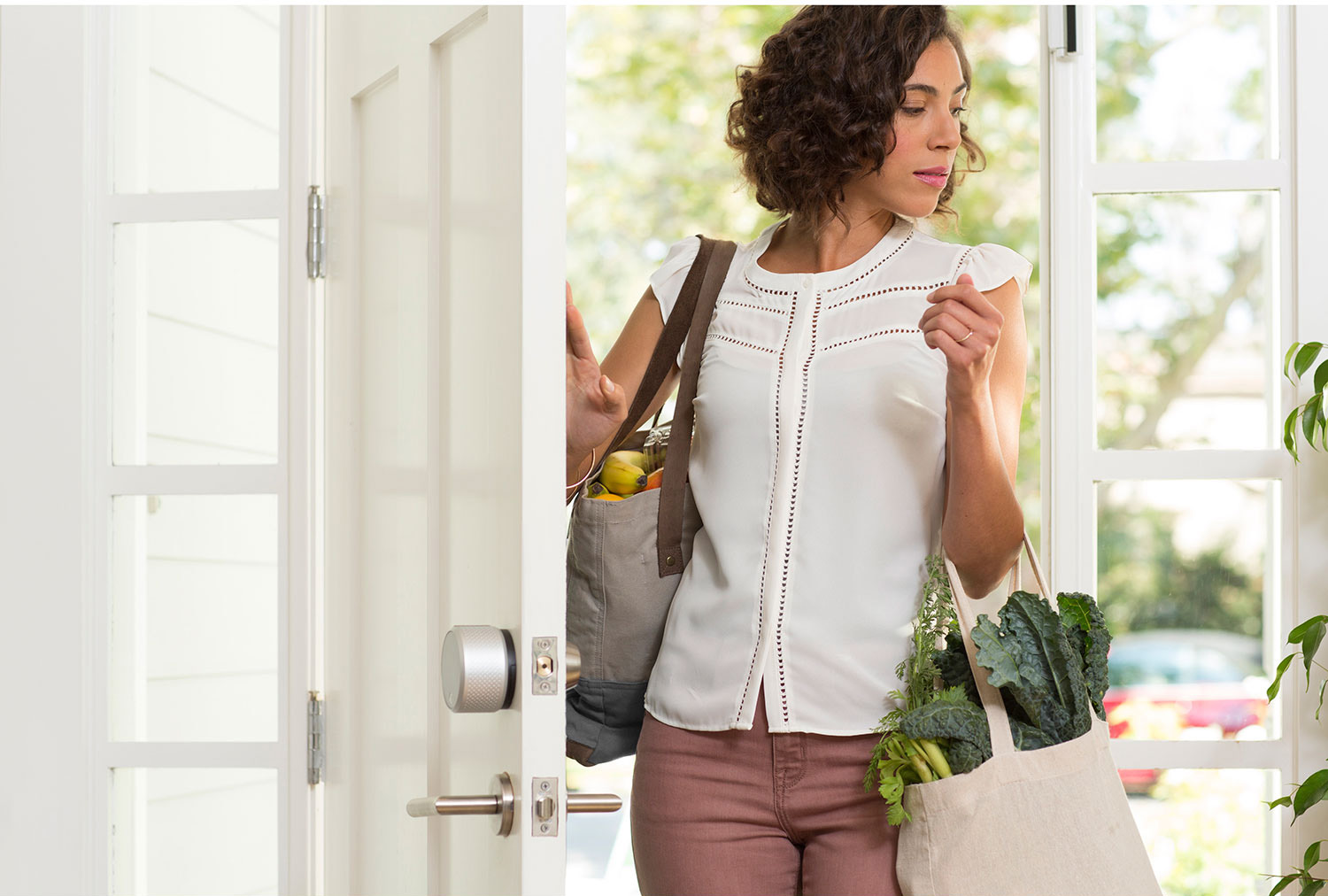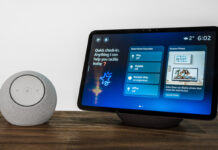
I’ve been saying for many years now that smart locks and smart doorbells are a gateway product to the rest of your smart home. Locks are really easy to install and can take less than a half hour. Doorbells require a bit more savviness and might require a helping hand. When Ring doorbells first came to Canada, they were so confident in their product that they offered buyers free installation from a local company. I’m not sure if this is still the case, but that always stuck with me as a neat offer. In this blog, I’ll be discussing why you should consider smart locks and doorbells, some of the advantages and options.
Why should you consider smart locks and smart doorbells?
Smart locks
Smart locks are the easiest way to start turning your home “smart” and typically the first step many homeowners take when creating a smart home. They require very little effort to install and can usually be done with nothing more than a screwdriver, a mobile app and some batteries (if they aren’t included in the box). Battery life is usually good for a few months at a time and these days, you don’t need additional hardware to connect to Wi-Fi like you used to 4-5 years ago when the first Bluetooth/Wi-Fi hybrids came out.
There are also two types of keyless entry smart locks out there. One is the more traditional style you would expect out of August or Yale. These smart locks typically feature a mechanized deadbolt inside your home that can be activated through the use a Mobile App. Then there’s something I’ve personally never seen before. eufy has a security video Wi-Fi smart doorbell that combines the benefits of a keypad smart lock with an added video camera up top.

Smart doorbells
Smart doorbells require a little bit more knowhow when it comes to wiring, including shutting off your circuit breakers, and, in some cases, installing an accompanying device in your electric chime to communicate with. There is a second type of smart doorbell that fits into your peephole, which is a great option for apartment style condo owners. However, it doesn’t seem like there are many of those in-market anymore (from the major manufacturers anyway).
Smart doorbells typically feature a video camera with two-way communication and sensitivity settings so that you can set up how often you want to be notified about activity at your front door. Sensitivity settings are key because it’ll be the difference between your doorbell camera telling you that there’s a person around your front door, or always notifying you every time a squirrel runs by.The majority of smart doorbells also come onboarded with some form of local or cloud—or both—storage capabilities. Some come with free trials after which you can subscribe for different rates (usually based on how long you want to keep your footage).

Depending on which lock or doorbell you choose, you’ll also have the added help of Amazon Alexa, Google Assistant (or in some cases, both) voice control.
Should you get Bluetooth or Wi-Fi devices?
Here’s where things get a bit tricky to figure out. Smart locks have traditionally worked with local Bluetooth, while you have needed Wi-Fi for a smart doorbell. With so many locks in the market, there are a healthy selection of Wi-Fi smart locks and Bluetooth smart locks.
One of the things that really used to bug me in the past was the fact that some manufacturers led products with Bluetooth first and required you to buy some sort of bridging device to connect things to Wi-Fi or other devices. I still have a 3rd generation August lock and doorbell with a bridge plugged in next to it. Thankfully, as these products have evolved, the additional guess work has disappeared as well. Nowadays, Wi-Fi is just included onboard with the majority of locks. However, there are still a handful of locks that are still Bluetooth only. And you may find that’s all you need! I’ll be honest with you. We’ve had smart locks on our front door for the last 10+ years, and because I’ve had Wi-Fi enabled garage door systems (thanks Chamberlain!), I don’t think I have ever needed to let somebody through the front remotely and have relied on just localized Bluetooth from the front door. I might be a more unique case though.
If you’re in the market for both at the same time, I would really recommend going with something that connects to the other one and allows for collaborative connectivity. For example, you probably can’t pair an Arlo smart doorbell and an Alfred smart lock.
As with having any continuously connected Wi-Fi device in your home, you need to make sure that the signal strength near the affected device is strong enough that you can support its features. I’ll talk about that a little bit more near the end of this article.
Expanding on smart security through smart locks and smart doorbells
Since all doorbells typically come with some sort of video camera attached, you can use your doorbell as a means of security for your front door—since it can alert you when the bell is ringing and send you a live feed of who is at your door and what motion is ongoing. I mentioned earlier that you can also purchase other security products that will work in tandem with your doorbell and locks too. If you properly configure your smart lock’s feature settings, you can have it trace timelines around when the door has been locked and unlocked.
August’s DoorSense sensor (which is included with their more comprehensive lock packages), for example, can tell you when the door is open or closed (since the lock itself can’t do that). I have one of these on my front door but have had varying levels of success with it working. However, my August lock is hooked up to my phone’s Apple Home which automatically tells me when the door is locked/unlocked anyway, so I’ve usually been using that as my go to.

Setting up guest keys
Many lock apps also allow you to hand out guest keys to family members, house sitters, etc. This will give you better control over understanding who is coming and going, and, since you can enable and disable these keys at any point, it will also give you full control over who has access to begin with.
This should effectively get rid of the idea of cutting and giving out extra keys. Speaking of which, if you just want to do away with keys altogether, there are some completely keyless smart locks from Yale and Alfred that feature numeric keypads on the front. Without a keyhole, this makes your front door effectively bump proof. As I mentioned above, companies like Lockly now also give you the added feature of fingerprint scanning if that interests you.
Additional security features
Smart doorbells will feature two-way communication and some level of night vision, so you can speak with whoever is at the door in real time if you need to, which means you can also greet any unwanted porch pirates. The first time I spoke about smart doorbells a few years ago, porch pirates weren’t as prevalent but I unfortunately see stories in the news much more often about stolen packages, especially around the holidays.

Should you start with smart locks or smart doorbells at first?
The answer to this one is simple in my opinion: Always go with the smart lock first. Make sure you do your research beforehand to find out which doorbells are compatible with the lock to get the most out of both, but the smart lock is something you can pick up and install over a cup of coffee in the morning, while you’ll have to put a little bit more time aside for the doorbell.
Before you commit to a smart lock, however, make sure the lock you pick out is compatible with the deadbolt you’re replacing it with. Honestly, this advice only applies to a very small group of you, but if you have an unusual lock set (like a Jimmy proof cylindrical style, or a Mortise lock) it’s very likely to be incompatible with smart locks.
If the above doesn’t apply to you and you’re in that 90% that have more traditional deadbolt sets, all you have to worry about now are finding the right type of lock for your needs, be it Bluetooth/Wi-Fi, keyless/bump proof or whatever you’d like to have. I want to offer one piece of advice though, and that is to make sure you find a lock with a company that’s fairly reputable and you can expect a long lifetime from. The options I’ve recommended in this blog I’d say are pretty reputable and should be around for a while. However, I’ve already seen one of the locks I used to have go sideways to where the company does not exist any longer.
What else do you need to know about having smart locks and smart doorbells?
There are a couple of odds and ends you should keep in mind in order to get the best experience from your smart entry system. The first is making sure you have a strong internet connection at your door. If you don’t, it’s going to cause some trouble. While your doorbell will work locally, you won’t get any notifications, will not be able to engage in any conversations or view any live video footage. If the connection is inconsistent or weak, this will also cause some problems.
Smart doorbells also need a certain amount of voltage in order to operate properly. If your home is older, you may find that there isn’t enough voltage for the doorbell to run as desired. Most smart doorbell apps will tell you in realtime how much power it is drawing and if it doesn’t have enough, the results will vary. Chances are the doorbell will still work in some capacity and the additional features (like video capability) will too. However, it might operate a little funny. You may only hear half a chime, or the chime might be faster than normal. Your doorbell’s buzzer may also emit a permanent low pitched hum. We had this problem with one of our doorbells one time. The hum wasn’t loud enough to be an annoyance, but you could always hear it in the background as you walked by it.
The last tip is to make sure batteries on any applicable devices are charged. Smart peephole cameras aren’t really that popular any longer, but if you end up installing one, battery life and performance tends to degrade over time, so you’ll want to make sure you keep notifications on and charge the battery overnight occasionally.
Whether you decide to install a smart lock, a smart doorbell (or both!), check out the wide selection at Best Buy.ca.





I love our smart locks. We use the one from Alfred and love the ability to use a fob. When u go running or swimming I just take the FOB and I don’t have to worry. One correction in your blog – Alfred has a smart lock that works with mortise locks!
Comments are closed.